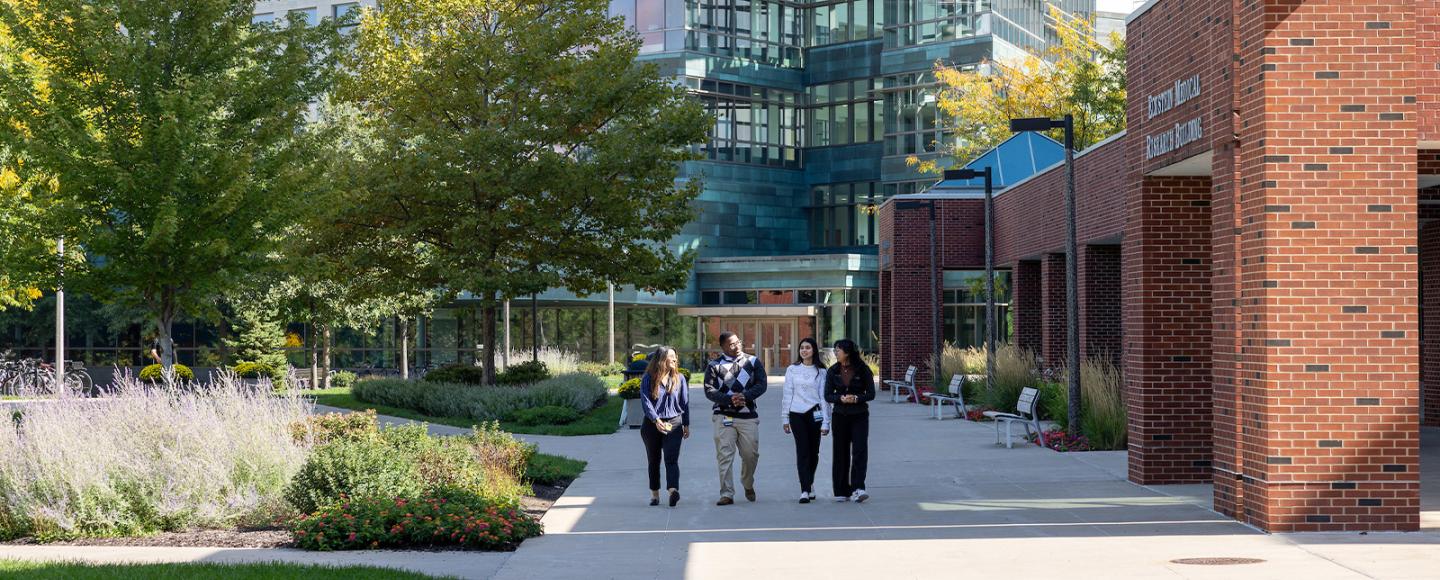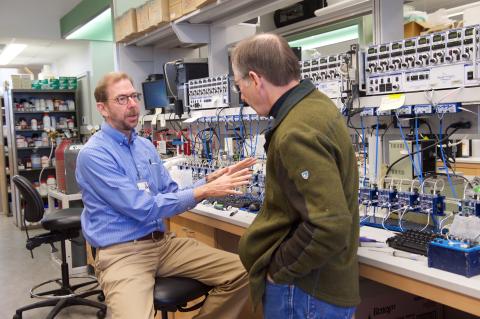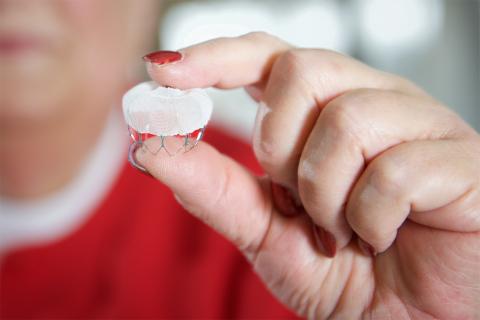Table of ContentsClose

News briefs

A study by Carver College of Medicine researchers suggests that certain drugs commonly used to treat enlarged prostate may also decrease the risk for dementia with Lewy bodies.
This observational finding may seem surprising, but it mirrors previous research at Iowa that links the drugs to a protective effect in another neurodegenerative condition: Parkinson's disease.
The UI researchers believe that a specific side effect of the drugs targets a biological flaw shared by dementia with Lewy bodies, Parkinson’s disease, and other neurodegenerative diseases—raising the possibility that the drugs may have broad potential for treating a range of neurodegenerative conditions.
For their study, the UI team used a large database of patient information to identify more than 643,000 men with no history of dementia with Lewy bodies who were newly starting one of six drugs used to treat benign prostatic hyperplasia (enlarged prostate).
Three of the drugs—terazosin, doxazosin, and alfuzosin (Tz/Dz/Az)—have an unexpected side effect in that they can boost energy production in brain cells. Preclinical studies suggest that this may help slow or prevent neurodegenerative diseases.
The other drugs, tamsulosin and two 5-alpha-reductase inhibitors called finasteride and dutasteride, do not enhance energy production in the brain and therefore provide a good comparison to test the effect of the Tz/Dz/Az drugs.
The team then followed the data on these men from when they started taking the medication until they left the database or developed dementia with Lewy bodies, whichever happened first. On average, the men were followed for about three years. The researchers found that men who took Tz/Az/Dz drugs were less likely to develop a diagnosis of dementia with Lewy bodies. They found no significant difference in risk between men taking tamsulosin and alpha reductase inhibitors.
This was an observational study, and therefore the results show only an association between taking the Tz/Dz/Az drugs and a reduced risk of developing dementia with Lewy bodies rather than a causal relationship. However, Simmering and his colleagues are excited by the potential of these drugs, which are already FDA-approved, inexpensive, and have been used safely for decades.
“If terazosin and these similar medications can help slow this progression—if not outright preventing the disease—this would be important to preserving cognitive function and quality of life in people with DLB,” says the study’s lead author, Jacob Simmering, PhD, an assistant professor in the Department of Internal Medicine.
The findings were published online June 19 in the journal Neurology.
As an institutional member of the prestigious National Academy of Inventors (NAI), the University of Iowa has formed a new local chapter of the organization.
“The University of Iowa Research Foundation created this institutional chapter with encouragement from the NAI to recognize local inventors and further foster a culture of innovation in our university community,” says Aliasger Salem, associate vice president for research and president for the UI chapter of the NAI.
The new chapter, established by the UI Research Foundation, expands access to NAI’s educational materials for inventors and entrepreneurs and provides a platform to recognize and celebrate a wide range of the university’s inventors. The new chapter members will be recognized at a reception in September 2024.
The 35 chapter members of the UI chapter of NAI include 20 faculty inventors—of which 11 are Carver College of Medicine faculty—who have made significant contributions to the university, and 15 honorary members who facilitate innovation and economic development.
The 11 Carver College of Medicine faculty include:
- Christopher Ahern, PhD, Molecular Physiology and Biophysics
- Evgeny Arshava, MD, Cardiothoracic Surgery
- John Engelhardt, PhD, Anatomy and Cell Biology
- Matthew Howard, MD, Neurosurgery
- Paul McCray, Jr., MD, Pediatrics
- Christopher Sales, MD, MPH, Ophthalmology and Visual Sciences
- Donna Santillan, PhD, Obstetrics and Gynecology
- Mark Santillan, MD, PhD, Obstetrics and Gynecology
- Andrean Simons-Burnett, PhD, Radiation Oncology
- Michael Welsh, MD, Internal Medicine
- Ziying Yan, PhD, Anatomy and Cell Biology
Howard and Engelhardt are also two of four UI faculty to receive the prestigious NAI Fellowship, which is the highest professional distinction given solely to academic inventors. Howard and Engelhardt were named NAI fellows in 2018 and 2019, respectively.

When the new University Iowa Health Care medical campus in North Liberty opens in the second quarter of 2025, it will be the new home for the Department of Orthopedics and Rehabilitation—providing a full range of musculoskeletal care, including orthopedic surgery, outpatient clinics and walk-in care for orthopedic injuries, sports medicine, and rehab services for a seamless patient experience.
The community and patients will also have access to an emergency department, a retail and 24-hour drive-thru pharmacy, advanced diagnostic imaging, clinical lab and pathology services, durable medical equipment (DME), a cafeteria, and other building amenities.
“This new campus will be a real game-changer for orthopedic patients, with convenient access to services and treatments on-site, plus collaboration and connection with the university campus for any services or care needs not available at the North Liberty location,” says J. Lawrence Marsh, MD, professor and chair of the Department of Orthopedics and Rehabilitation. “For example, with an on-site anesthesia clinic, we’ll have the ability to offer same-day preoperative care for some patients. Outpatient surgery and outpatient follow-up care after discharge also will be done on-site. And we will be able to provide patients with pharmacy services and outpatient physical therapy right in the convenience of the building before heading home, should they choose us for those services.”
Expanding access on university campus
The North Liberty campus, which features a three-level hospital and five-level medical office building, will also create space and opportunities to expand access to complex care at UI Health Care’s university campus, notes Denise Jamieson, MD, MPH, UI vice president for medical affairs and the Tyrone D. Artz Dean of the Carver College of Medicine.
“Complex care involves specialized care teams across multiple medical specialties. It’s a level of coordination and expertise—and the right equipment, technology, and space—not available at every hospital,” Jamieson says. “The opening of the North Liberty campus will mean greater access and convenience for patients. It will also allow us to increase our capacity on the university campus to accept patients with complex and critical care needs being transferred from hospitals across Iowa.”

To improve access at UI Health Care’s university campus, renovation is underway for Level 7 of the John Pappajohn Pavilion—increasing the number of inpatient beds for antepartum and postpartum care from 38 to 61. Planning is also expected for expanded labor and delivery capacity in the next few years.
Over 3,000 babies are born each year at the university campus, and that number has increased in recent years. The addition of UI Health Care’s downtown campus provides additional capacity for pregnancy care, but more OB beds at the university location are needed as access to maternal health services across Iowa becomes more constrained.
The Level 7 JPP renovation is one of many construction projects currently underway or set to begin soon on the university campus. Renovations and expansions are also happening in the burn unit, emergency department, neurology clinic, and neonatal intensive care unit.
University of Iowa Health Care has launched a Medical Toxicology Clinic—the first and only clinic of its kind in Iowa— providing outpatient care for patients exposed to toxic substances.
Daniel McCabe (13MD), clinical associate professor in the Department of Emergency Medicine and the clinic’s director, expects to see a variety of patients, with heavy metal exposures likely to be the most common—particularly lead poisoning, which historically has been higher in Iowa than the national average.
Initially, the clinic will operate every other Wednesday in the Medical Specialty Clinics on UI Health Care’s university campus, seeing patients only by referral. The clinic may also see patients referred by providers with the Veterans Health Administration, who treat veterans with a variety of toxic exposures related to their time in the armed forces. Patients with issues related to high levels of pesticide exposure may also be referred to the clinic.
“For many primary care physicians, they may see a severe poisoning case only once in their career,” McCabe says. “Every week, we receive calls from providers asking for counsel on these types of cases. We know how to quickly assess each patient’s unique circumstances, including where and how the exposure may be occurring.”

University of Iowa researchers were part of a team that developed a new gene editing approach to correct the most common mutation that causes cystic fibrosis (CF).
The Iowa group—led by Paul McCray Jr., MD, and in collaboration with researchers at the Broad Institute of MIT and Harvard University led by David Liu, PhD—optimized a gene-editing approach known as prime editing. The new method allowed the researchers to precisely and durably correct the CF mutation in human lung cells and restore cell function to levels similar to current drug therapies. The findings were published recently in Nature Biomedical Engineering.
Cystic fibrosis causes thick mucus buildup in the lungs and other parts of the body, leading to breathing problems and infections. A three-drug cocktail known as Trikafta, developed in 2019, has greatly improved patients’ quality of life, but some patients do not respond to the drug while others cannot tolerate its side effects.
“These new drugs have dramatically improved outcomes for most patients with CF,” says McCray, professor of pediatrics–pulmonary medicine and the Roy J. Carver Chair in Pulmonary Research. “But if we can develop safe, effective gene editing therapies, we could potentially create one-time, lasting treatments for CF with fewer side effects. This work takes us one step closer to that goal.”
Cystic fibrosis is caused by mutations in the CFTR gene that disrupt ion channels in the cell membrane that allow chloride to leave cells. The most common mutation, which occurs in 85% of all patients with CF, is called CFTR F508del and involves a three-base-pair deletion that causes the ion channel protein to misfold and degrade.
Previous attempts to correct this specific CFTR mutation with gene editing have not been efficient enough to produce a therapeutic benefit or have used approaches that generate double-stranded breaks in DNA, which can lead to unwanted changes in the target gene and other locations in the genome. Prime editing—the new method developed by Liu’s and McCray’s teams—is a more flexible and controlled kind of gene editing that does not require double-stranded breaks.
Several University of Iowa Health Care leadership positions have been filled over the past several months. The appointments come at a transformative time as UI Health Care continues its evolution as system of connected care.
“We are fortunate we have many exceptional leaders serving our organization,” says Denise Jamieson, MD, MPH, vice president for medical affairs and the Tyrone D. Artz Dean of the Carver College of Medicine, “and introducing new talent with new ideas and skill sets will strengthen our teams even further to better serve Iowans.”
The new leaders and appointments include:

Mark Burkard, MD, PhD
Director, Holden Comprehensive Cancer Center
Burkard will join the cancer center Oct. 1 from the University of Wisconsin, where he is professor in the UW Department of Internal Medicine and its hematology, medical oncology, and palliative care division. He also serves as associate director of genomics and precision medicine at the UW Carbone Cancer Center.

Kris DeMali, PhD
Chair and departmental executive officer, Department of Biochemistry and Molecular Biology
DeMali, whose appointment was effective June 7, had served as interim department chair since August 2020. Her research is at the forefront of the field of mechanobiology, which focuses on how physical forces and changes in the mechanical properties of cells and tissues contribute to development, physiology, and disease.

Jim Leste, MS, FACHE
Chief administrative officer, Stead Family Children’s Hospital
Leste began his new role July 29 after two decades in various leadership positions with Children’s Minnesota: vice president of support operations, senior director of surgical specialties, director of safety, security, and emergency management, and, most recently, vice president of operations.

Jennifer Miller, MHA, MPH, RD
Chief administrative officer, UI Health Care downtown campus
Miller, whose appointment was effective July 8, had served the UI Health Care clinical enterprise as support services director since 2014—overseeing Accreditation Services, Environmental Services, Safety and Security, Central Sterilization Services, Food and Nutrition Services, Supply Chain, Engineering Services, and the University Employee Health Clinic.

Christian Pettker, MD
Chair and departmental executive officer, Department of Obstetrics and Gynecology
Pettker, who began at Iowa on July 1, came to Iowa from the Yale School of Medicine, where he was a professor in the Department of Obstetrics, Gynecology, and Reproductive Services. A maternal-fetal medicine specialist, Pettker’s interests include quality and safety in obstetrics and improving the health of mothers and infants.

Jody Reyes, FACHE, MSBA, BSN
Chief operating officer, UI Health Care clinical enterprise
Prior to joining UI Health Care on June 28, Reyes served as senior vice president and COO at Penn State Health’s Milton S. Hershey Medical Center in Hershey, Pennsylvania. Reyes was named “One of 60 Academic Medical Center COOs to Know” earlier this year by Becker’s Hospital Review.

Upinder Singh, MD
Chair and departmental executive officer, Department of Internal Medicine
Singh will join UI Health Care on Oct. 1 from Stanford University School of Medicine, where she is a professor and chief of infectious diseases and geographic medicine. She is a physician-scientist with clinical expertise in infectious diseases, and her research interests include parasitology and COVID-19.

More than a decade ago, University of Iowa Health Care researchers began evaluating the use of an implanted, coin-sized device designed to help patients with atrial fibrillation (Afib) who didn't do well on blood thinners.
This past spring, UI Health Care cardiologists completed their 500th left atrial appendage occlusion procedure, which involves implanting an umbrella-shaped filter that catches blood clots before they leave the heart. For some patients with Afib, blood clots can form in a small pocket of space inside the heart. If these clots are pumped out of the heart, they can travel to the brain and cause a stroke.
The device, which is implanted during a minimally invasive procedure, traps clots within the pocket, decreasing the risk of stroke by 80%. UI Heart and Vascular Center specialists were first in Iowa to offer the treatment.
“Traditionally, patients with atrial fibrillation were given blood thinners, like warfarin and newer agents. These drugs increase the risk of bleeding complications,” says Phillip Horwitz, MD, executive director of UI Heart and Vascular Center. “For those patients at a higher risk of developing blood clots and bleeding, this procedure has been game-changing because it reduces their risk of stroke without the use of blood thinners.”
University of Iowa Health Care has launched a Medical Toxicology Clinic—the first and only clinic of its kind in Iowa— providing outpatient care for patients exposed to toxic substances.
Daniel McCabe (13MD), clinical associate professor in the Department of Emergency Medicine and the clinic’s director, expects to see a variety of patients, with heavy metal exposures likely to be the most common—particularly lead poisoning, which historically has been higher in Iowa than the national average.
Initially, the clinic will operate every other Wednesday in the Medical Specialty Clinics on UI Health Care’s university campus, seeing patients only by referral. The clinic may also see patients referred by providers with the Veterans Health Administration, who treat veterans with a variety of toxic exposures related to their time in the armed forces. Patients with issues related to high levels of pesticide exposure may also be referred to the clinic.
“For many primary care physicians, they may see a severe poisoning case only once in their career,” McCabe says. “Every week, we receive calls from providers asking for counsel on these types of cases. We know how to quickly assess each patient’s unique circumstances, including where and how the exposure may be occurring.”
University of Iowa Health Care Medical Center was once again ranked the top hospital in Iowa and recognized in eight adult care specialties in the 2024-2025 “Best Hospitals” rankings published by U.S. News & World Report.
UI Health Care Medical Center ranked among the top 50 hospitals nationally for three specialties:
- Ophthalmology: No. 6
- Ear, nose, and throat: No. 14
- Cancer: No. 41
Five specialties were designated as “High-Performing,” which places them in the top 10% of hospitals across the country:
- Cardiology, heart and vascular surgery
- Gastroenterology and GI surgery
- Orthopedics
- Pulmonology and lung surgery
- Urology
In its 2024-2025 edition of “Best Medical Schools,” U.S. News ranks the UI Carver College of Medicine in these categories:
- Physical Therapy: No. 2
- Physician Assistant: No. 2
- Most Graduates Practicing in Rural Areas: No. 35
- Most Graduates Practicing in Health Professional Shortage Areas: No. 74
- Most Graduates Practicing in Primary Care: No. 88
- Most Diverse Medical Schools: No. 97
- Primary Care: Tier 2
- Research: Tier 2
This year, U.S. News placed medical schools in one of four tiers for the Primary Care and Research categories. Each school’s tier was derived from an overall score, calculated across several factors. The first two tiers in each category comprise approximately 50 medical schools.
U.S. News also ranks “Best Children’s Hospitals” each year. These rankings will be released later this fall.
In the News
Selected quotes from Carver College of Medicine faculty featured online and in the news media.
“Pregnant women oftentimes don’t know that they are at increased risk for urinary tract infections, or they may not be aware of risk of progression of UTIs. While they are common for women and mild for most women outside of pregnancy, they can be quite dangerous in pregnancy ... pregnant women need to present to the doctor sooner than nonpregnant women and get treated for a UTI.”
Laura Steers, MD (22R), clinical assistant professor in the Department of Obstetrics and Gynecology, emphasizes prompt attention to urinary tract infections among pregnant women in an American Medical Association article on “What doctors wish patients knew about UTI prevention,” part of the AMA’s “What doctors wish patients knew” series.

“We try to make it clear what the top athletes are doing. The top athletes maintain the weight pretty well year-round. They’re not using rapid weight reduction practices. They’re definitely not stepping on the scale under-fueled or under-hydrated.”
Andy Peterson, MD, MSPH, clinical professor of general pediatrics and adolescent medicine in the Stead Family Department of Pediatrics, and a team physician with the Iowa Hawkeyes wrestling program, tells USA Today that high school and college wrestlers are continually educated about how dropping significant pounds in water weight before a match is dangerous and puts wrestlers at a competitive disadvantage.

“This has really raised awareness about how overdoses affect people across all demographics, including college students, and we want students to be willing to help if a situation like this were to arise.”
Andrea Weber (12MD, 15MME, 17R), clinical associate professor in the Department of Psychiatry, tells The Daily Iowan about efforts to increase access to naloxone, or Narcan, to treat opioid overdoses. Earlier this year, University of Iowa Student Wellness and the UI Addiction and Recovery Collaborative led efforts to place naloxone kits in campus residence halls.

Paper trail
A small sample of notable manuscripts recently published by University of Iowa researchers.
New England Journal of Medicine
Intrathecal gene therapy for giant axonal neuropathy.
Bharucha-Goebel DX, Todd JJ, Saade D, Norato G, Jain M, Lehky T, Bailey RM, Chichester JA, Calcedo R, Armao D, Foley AR, Mohassel P, Tesfaye E, Carlin BP, Seremula B, Waite M, Zein WM, Huryn LA, Crawford TO, Sumner CJ, Hoke A, Heiss JD, Charnas L, Hooper JE, Bouldin TW, Kang EM, Rybin D, Gray SJ, Bönnemann CG; GAN Trial Team.
New England Journal of Medicine
2024 Mar 21;390(12):1092-1104
Science
JAK inhibition enhances checkpoint blockade immunotherapy in patients with Hodgkin lymphoma.
Zak J, Pratumchai I, Marro BS, Marquardt KL, Zavareh RB, Lairson LL, Oldstone MBA, Varner JA, Hegerova L, Cao Q, Farooq U, Kenkre VP, Bachanova V, Teijaro JR.
Science
2024 Jun 21;384(6702)
New England Journal of Medicine
Noninvasive ventilation for preoxygenation during emergency intubation.
Gibbs KW, Semler MW, Driver BE, Seitz KP, Stempek SB, Taylor C, Resnick-Ault D, White HD, Gandotra S, Doerschug KC, Mohamed A, Prekker ME, Khan A, Gaillard JP, Andrea L, Aggarwal NR, Brainard JC, Barnett LH, Halliday SJ, Blinder V, Dagan A, Whitson MR, Schauer SG, Walker JE Jr, Barker AB, Palakshappa JA, Muhs A, Wozniak JM, Kramer PJ, Withers C, Ghamande SA, Russell DW, Schwartz A, Moskowitz A, Hansen SJ, Allada G, Goranson JK, Fein DG, Sottile PD, Kelly N, Alwood SM, Long MT, Malhotra R, Shapiro NI, Page DB, Long BJ, Thomas CB, Trent SA, Janz DR, Rice TW, Self WH, Bebarta VS, Lloyd BD, Rhoads J, Womack K, Imhoff B, Ginde AA, Casey JD; PREOXI Investigators and the Pragmatic Critical Care Research Group.
New England Journal of Medicine
2024 Jun 20;390(23):2165-2177
